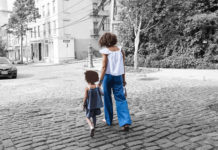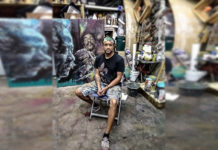by Sharhonda Bossier
When I embarked on a search for a new home a year ago, New Orleans was an easy choice for me. I had always loved her and her people.
New Orleans is the city that birthed the grandmother who raised me. My grandfather was from Louisiana also, but it was always New Orleans that loomed large in the lore of my family.
My grandparents made sure that people from New Orleans surrounded us. We attended St. Brigid Catholic Church, a large Catholic church with many people born and bred in New Orleans. We looked forward to the annual events put on by the Louisiana to Los Angeles Organizing Committee. We aspired to join the Knights of Peter Claver Ladies Auxiliary. We wanted desperately to share in the culture these people brought with them from “back home” and to share something with the aunts, uncles, and cousins who were privileged enough to call Louisiana home.
Before moving to New Orleans, I had not anticipated all of the many things that would make living here as an adult, with the newly minted privilege of being a high earning college graduate, challenging. I hadn’t anticipated being placeless here.
I now sit at the intersections of many communities that make life in New Orleans “interesting”. I am not from New Orleans. I am Black. I grew up poor, but am part of a new wave of gentrification in the city. I am a woman. I am queer. I work in education reform. It is impossible for me to go anywhere in this city or to engage in any conversation here, without thinking about the state of the Black community. I cannot help but wonder whether the work I, and so many of the (often white) people in my professional network, have dedicated ourselves to is having any real impact on the lives of the city’s most vulnerable children.
It is also impossible not to be reminded, constantly, of how far this city has to go with regard to the deeply embedded racial, social, and class hierarchies that still exist here.
And, so, it’s complicated.
I believe that a quality education is the surest and fastest route to gainful employment for the many New Orleanians who confront the challenges of economic and social isolation every day. They live far away in pockets of the city with abysmal transportation options. They work the lowest paid service industry jobs. And while they are the faces represented on most of New Orleans’ postcards, they have little access to decision-making power in this city.
I care about the state of public education in New Orleans not because I’m concerned with anyone’s ability to claim credit for “progress since Katrina”, but because the city I have always loved so much desperately needs all of her people to help her reclaim her rightful place as the cultural and arts powerhouse she is.
But Black New Orleans and White New Orleans only come together in support the Saints or for a cup of gumbo at Little Dizzy’s. They rarely feel united or are even in honest conversations about things that matter most. Add to that, education reformers – many who are white migrants – have too often ignored the valid concerns raised by community members.
Many of us who arrive here with time, talent and resources to lend are unsure of where to start. And so for those of us who are invited to both the Zulu Ball and the St. Patrick’s Day block parties, it’s hard to find our place.
We find ourselves standing up for the real progress that has been made over the past decade in New Orleans while also having to own that many of our colleagues could have done more to engage communities in deciding what schools they wanted or needed after the storm.
We find ourselves having to defend the motives of other transplants who wanted desperately to help a city recovering from disaster, but were perhaps a bit naïve in their understanding of the depth and complexity of the challenges ahead.
We find ourselves having to champion the causes of organizations whose work we support and believe in while acknowledging that more needs to be done to diversify their staffs – especially at the most senior levels of leadership.
We know that the past decade has been a critical period of time for proving what is possible in public education in New Orleans, but we also know that this city’s history is longer than a decade; its challenges deeply rooted and not solvable in such a short period of time.
Here’s what is maybe the most complicated: I, the black non-native education reformer and critic, have no place here.
So I, the black non-native education reformer and critic, who cares deeply about the city and its progress, am stuck.
It’s truly complicated.
********************
Sharhonda Bossier is Vice President, Network Impact at Education Cities, a national nonprofit that supports and advises city-based education organizations on their efforts to grow great public schools. In addition to core advising work, Sharhonda utilizes her experience launching and leading a multi-state education engagement and advocacy organization to help our members develop the skills and capacity to engage much more effectively with stakeholders.
Prior to joining the Education Cities team, Sharhonda co-founded Families for Excellent Schools where she developed their training program and overall parent engagement strategy.











[…] This post originally appeared on Citizen Ed. […]
Sista believe me you are right where you belong. Thanks